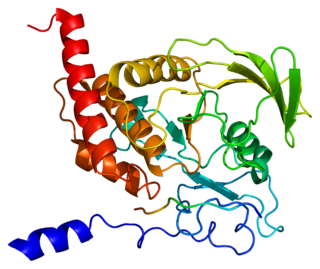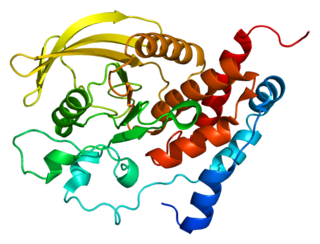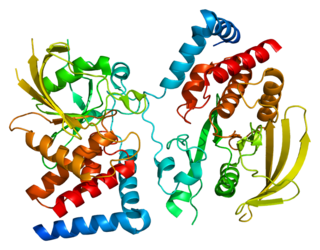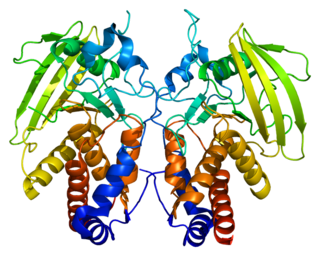Related Research Articles

Protein tyrosine phosphatases (EC 3.1.3.48, systematic name protein-tyrosine-phosphate phosphohydrolase) are a group of enzymes that remove phosphate groups from phosphorylated tyrosine residues on proteins:

Receptor tyrosine kinases (RTKs) are the high-affinity cell surface receptors for many polypeptide growth factors, cytokines, and hormones. Of the 90 unique tyrosine kinase genes identified in the human genome, 58 encode receptor tyrosine kinase proteins. Receptor tyrosine kinases have been shown not only to be key regulators of normal cellular processes but also to have a critical role in the development and progression of many types of cancer. Mutations in receptor tyrosine kinases lead to activation of a series of signalling cascades which have numerous effects on protein expression. The receptors are generally activated by dimerization and substrate presentation. Receptor tyrosine kinases are part of the larger family of protein tyrosine kinases, encompassing the receptor tyrosine kinase proteins which contain a transmembrane domain, as well as the non-receptor tyrosine kinases which do not possess transmembrane domains.

Tyrosine-protein phosphatase non-receptor type 11 (PTPN11) also known as protein-tyrosine phosphatase 1D (PTP-1D), Src homology region 2 domain-containing phosphatase-2 (SHP-2), or protein-tyrosine phosphatase 2C (PTP-2C) is an enzyme that in humans is encoded by the PTPN11 gene. PTPN11 is a protein tyrosine phosphatase (PTP) Shp2.

Protein tyrosine phosphatase, receptor type, C also known as PTPRC is an enzyme that, in humans, is encoded by the PTPRC gene. PTPRC is also known as CD45 antigen, which was originally called leukocyte common antigen (LCA).

Tyrosine-protein phosphatase non-receptor type 6, also known as Src homology region 2 domain-containing phosphatase-1 (SHP-1), is an enzyme that in humans is encoded by the PTPN6 gene.

Receptor-type tyrosine-protein phosphatase alpha is an enzyme that in humans is encoded by the PTPRA gene.

Receptor-type tyrosine-protein phosphatase F is an enzyme that, in humans, is encoded by the PTPRF gene.

Receptor-type tyrosine-protein phosphatase zeta also known as phosphacan is an enzyme that in humans is encoded by the PTPRZ1 gene.

Receptor-type tyrosine-protein phosphatase eta is an enzyme that in humans is encoded by the PTPRJ gene.

Protein tyrosine phosphatase non-receptor type 7 is an enzyme that in humans is encoded by the PTPN7 gene.

Receptor-type tyrosine-protein phosphatase mu is an enzyme that in humans is encoded by the PTPRM gene.

Receptor-type tyrosine-protein phosphatase S, also known as R-PTP-S, R-PTP-sigma, or PTPσ, is an enzyme that in humans is encoded by the PTPRS gene.

Receptor-type tyrosine-protein phosphatase PCP-2, is an enzyme that in humans is encoded by the PTPRU gene.

Protein tyrosine phosphatase receptor-type R is an enzyme that in humans is encoded by the PTPRR gene.

Receptor-type tyrosine-protein phosphatase delta is an enzyme that, in humans, is encoded by the PTPRD gene.

Receptor-type tyrosine-protein phosphatase gamma is an enzyme that in humans is encoded by the PTPRG gene.

Tyrosine-protein phosphatase non-receptor type 3 is an enzyme that in humans is encoded by the PTPN3 gene.

Receptor-type tyrosine-protein phosphatase T is an enzyme that in humans is encoded by the PTPRT gene.

Receptor-type tyrosine-protein phosphatase O is an enzyme that in humans is encoded by the PTPRO gene.

Tyrosine-protein phosphatase non-receptor type 4 is an enzyme that in humans is encoded by the PTPN4 gene.
References
- ↑ Dudek RW (1 November 2006). High-yield cell and molecular biology. Lippincott Williams & Wilkins. pp. 19–. ISBN 978-0-7817-6887-0 . Retrieved 16 December 2010.